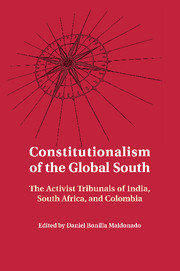Description
Constitutionalism of the Global South
The Activist Tribunals of India, South Africa, and Colombia
Coordinator: Bonilla Maldonado Daniel
Addresses the jurisprudence of the major courts of the Global South on the topics of access to justice, cultural diversity and socioeconomic rights.
Language: English
Subject for Constitutionalism of the Global South:
Constitutionalism of the Global South
Publication date: 10-2014
Support: Print on demand
Publication date: 10-2014
Support: Print on demand
Constitutionalism of the Global South
Publication date: 04-2013
422 p. · 15.2x22.9 cm · Hardback
Publication date: 04-2013
422 p. · 15.2x22.9 cm · Hardback
Description
/li>Contents
/li>Biography
/li>
The Indian Supreme Court, the South African Constitutional Court and the Colombian Constitutional Court have been among the most important and creative courts in the Global South. In Asia, Africa and Latin America, they are seen as activist tribunals that have contributed (or attempted to contribute) to the structural transformation of the public and private spheres of their countries. The cases issued by these courts are creating a constitutionalism of the Global South. This book addresses in a direct and detailed way the jurisprudence of these Courts on three key topics: access to justice, cultural diversity and socioeconomic rights. This volume is a valuable contribution to the discussion about the contours and structure of contemporary constitutionalism. It makes explicit that this discussion has interlocutors both in the Global South and Global North while showing the common discourse between them and the differences on how they interpret and solve key constitutional problems.
Part I. Introduction; Part II. Socio-economic Rights: 1. Constitutions and distributive justice: complementary or contradictory? David Bilchitz; 2. The embedded negotiators: India's higher judiciary and socioeconomic rights Shylashri Shankar; 3. Economic and social rights, prisons, and the Colombian constitutional court Libardo Ariza; Part III. Cultural Diversity: 4. Cultural diversity, 'living law', and power: progress and contradictions Cathi Albertyn; 5. Keeping the faith: legitimizing democracy through judicial practices Gurpreet Mahajan; 6. Self-government and cultural identity: the Colombian constitutional court and the right to prior consultation Daniel Bonilla; Part IV. Access to Justice: 7. Courts and structural poverty in South Africa: has the constitutional court expanded access and remedies to the poor? Jackie Dugard; 8. Access to justice in India: the jurisprudence (and self-perception) of the Supreme Court Menaka Guruswamy and Bipin Aspatwar; 9. Access to constitutional justice in Colombia: opportunities and challenges for social and political change Manuel Iturralde.
Daniel Bonilla is Distinguished Leitner Center Visiting Professor at Fordham Law School and Associate Professor of Law at the Universidad de los Andes in Bogotá, Colombia. He received his JSD and LLM from Yale Law School. He has been a visiting professor or lecturer at a number of institutions, including Yale Law School, Oñati International Institute for the Sociology of Law, Fordham Law School, University of Texas School of Law, Georgia State University College of Law and Universidad Nacional de Colombia. His recent publications include La función social de la propiedad (2012), Democracia, derecho y economía de mercado (2010) and Teoría del derecho y transplantes jurídicos (2009). He is the recipient of a Fulbright Fellowship and several awards for excellence in teaching.
© 2024 LAVOISIER S.A.S.




